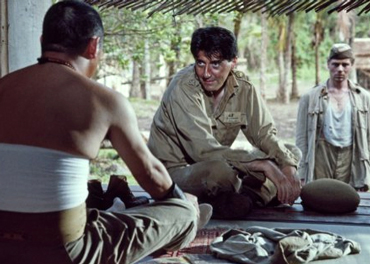
 |
|
|
|
Filmmakers have been using the plight of prisoners of war for expressive purposes since the silent days, starting with propaganda pieces in WW1. Jean Renoir's masterpiece Grand Illusion commented on class differences and international brotherhood. The subgenre came of age after WW2 when Billy Wilder's Stalag 17 and the English The Colditz Story introduced comedy and adventure motifs into what had previously been mostly sober subject matter. John Sturges' The Great Escape became enormously popular, and during its making screenwriter James Clavell was inspired to write up his personal memories of a Japanese POW camp, which became the pessimistic King Rat. As repeated ad infinitum in celebrated epics (David Lean's Bridge on the River Kwai) and more exploitative shock films (Val Guest's The Camp on Blood Island), the feudal-era military culture of the Japanese army didn't acknowledge prisoners as soldiers worthy of respect. Starved, overworked and denied medical attention, Allied prisoners died by the hundreds in some Japanese camps. 
1983's Merry Christmas Mr. Lawrence was made by Nagisa Ôshima, a director who went beyond maverick status to become an authentic cinematic renegade. Ôshima rejected the humanistic outlook of directors like Ozu and Kurosawa. His 60s crime thrillers embraced radical stylistic elements, but also attacked traditional Japanese prejudices, such as the discrimination against Korean immigrants. Refusing to bend with the 1970s downturn in Japanese commercial cinema, Ôshima sought foreign co-sponsorship to create a pair of shockingly frank movies that worked unsimulated sex into their plotlines. Merry Christmas Mr. Lawrence is another foreign co-production. It's a curious film with a beautiful surface (which finally can be appreciated in this Blu-ray presentation) that takes a different route through the standard POW camp tale. The Java prison run by the handsome, formal young officer Capt. Yonoi (Ryuchi Sakamoto, also the film's composer) has its share of cruelties. The sometimes lax and even friendly Sgt. Gengo (Takeshi, aka Takeshi Kitano) frequently converses with British Army Colonel John Lawrence (Tom Conti), who is fluent in Japanese. Lawrence works to bridge the gulf between Japanese and Brit definitions of military honor. But prisoner leader Group Capt. Hicksley (Jack Thompson) takes an entirely hard-line approach and suspects Lawrence's attempts at communication. The story begins with a Japanese soldier accused of having homosexual sex with a prisoner, an episode that ends with a brutal execution and another suicide. Capt. Yonoi's leadership is brought into question when he openly shows favoritism to a new prisoner, Major Jack Celliers (David Bowie). Yonoi's own guards become concerned that this imposing blonde enemy soldier has cast a spell on their commander, and Gengo and Lawrence are caught in the middle. Punished for a radio set found in one of the barracks, Celliers is targeted for murder by a junior Japanese officer who hopes to release Yonoi from his influence. Lawrence frees Celliers and both are recaptured by Yonoi, but spared from execution. When it looks as if Group Captain Hicksley will be beheaded in front of his men, Celliers dares to intervene with a shocking display for all to see. Hicksley is saved, but the rules mandate that Yonoi inflict the harshest of punishments. 
A strange picture by any measure, Merry Christmas Mr. Lawrence balances traditional prison camp themes with sublimated sexual drives and Cellier's weird back story, seen in confessional flashbacks. Like Conrad's Lord Jim, Jack's valor in battle and leadership position in the camp is an attempt to compensate for his terrible treatment of his younger brother. Back in childhood, Jack coldly abandoned his brother to the cruelty of school bullies. Even in flashbacks showing both brothers as young men, the brother is pictured as an unchanging young boy. Meanwhile, Lawrence slowly builds a tentative comradeship with the likeable Gengo. When both Lawrence and Celliers are in special detention awaiting possible execution, Gengo gets drunk and releases them both as a gesture of good will on Christmas ... hence the film's title. Both Tom Conti and Takeshi Kitano went on to prolific film careers. As "Beat" Takeshi, Kitano wrote, produced and acted in a reboot of the Zatoichi franchise. David Bowie's performance is much less mannered than his morose Man Who Fell to Earth, although this film's Celliers also strikes occasional Garbo-like poses. Yonoi is a quiet fanatic respected by his superiors; he reveals little of himself to others and presents a striking impression in court. But Yonoi recklessly practices swordsmanship with real samurai blades, behavior disapproved by his fellow officers. A glance at a bare synopsis makes the film look absorbed with homosexual heat in a prison camp, which it is not; everything about the troubled Yonoi-Celliers relationship is a matter of conjecture. Even Celliers claims he doesn't know what's going on, an attitude that might be due to the necessity of asserting a straight identity in the military. The poor Dutch guy caught being raped by the Japanese prison guard may or may not have been a voluntary participant, but when the news breaks he immediately becomes a pariah. Director Ôshima would further explore the incompatibility / harmony of homosexuality in a militant culture in his later Samurai film Taboo. 
The movie looks and sounds fantastic. The Japanese prison is a converted rubber plantation, with a greenhouse turned into a camp hospital. Unifying everything is composer Ryuchi Sakamoto's amazing, somewhat indescribable music. It is both harmonious and seductive, and uses an interesting mix of unusual instruments. The music isn't scored to the film and instead adds another layer of reflection to an already thought-provoking story. The main theme became Sakamoto's most-recognized piece of music and has been covered innumerable times. Criterion's Blu-ray of Merry Christmas Mr. Lawrence is the first opportunity most of us have had to see this great film in a presentable condition -- old broadcasts on the "Z Cable" channel didn't look too good and VHS tapes from the 1980s were even worse. The widescreen image glows with rich colors that show off Ôshima's beautiful compositions. Cinematographer Toichiro Narushima's unusual night-for-night camerawork evokes the feel of moonlit areas -- we can see everything, but it still feels like clammy tropical darkness. The stereo surround tracks (in DTS-HD Master Audio) make the Sakamoto music seem brighter and clearer than the coveted collector's CD. Disc producer Karen Stetler takes advantage of access to several of the film's top creatives to assemble a selection of definitive extras. Producer Jeremy Thomas, screenwriter Paul Mayersberg, Tom Conti and Ryuchi Sakamoto all contribute interviews; the self-effacing Sakamoto admits that he literally didn't know what he was doing when he first put his music tracks together. The Ôshima Gang is a 1983 making-of piece, while Hasten Slowly is a 60-minute documentary on Laurens van der Post, the film's source author. A trailer rounds out the video extras. The thick insert booklet contains an essay by Chuck Stephens, and interview reprints with director Ôshima and actor Takeshi Kitano.
On a scale of Excellent, Good, Fair, and Poor,
Merry Christmas Mr. Lawrence Blu-ray rates:
Reviews on the Savant main site have additional credits information and are often updated and annotated with reader input and graphics. Also, don't forget the 2010 Savant Wish List. T'was Ever Thus.
Review Staff | About DVD Talk | Newsletter Subscribe | Join DVD Talk Forum |
| ||||||||||||||||||